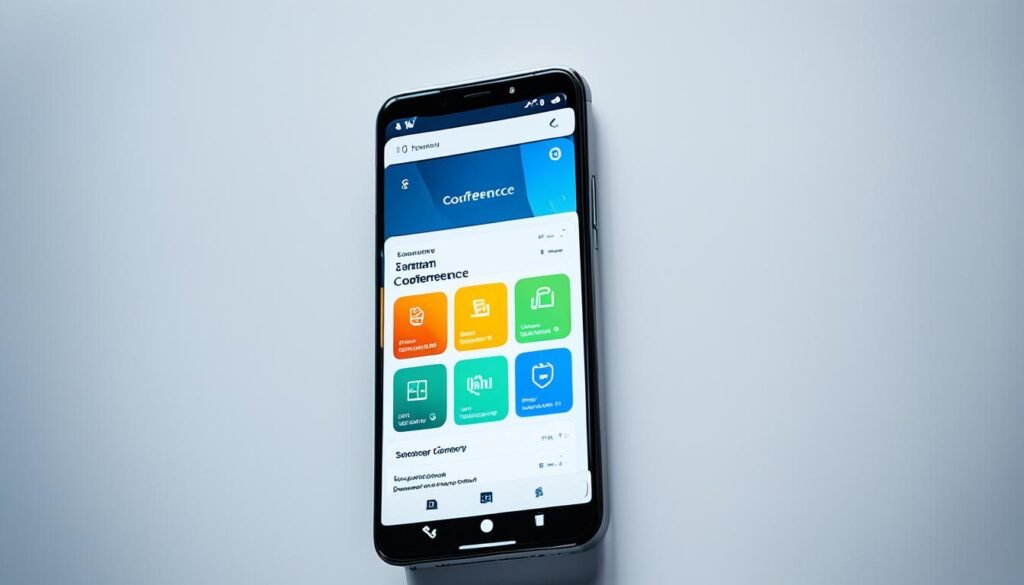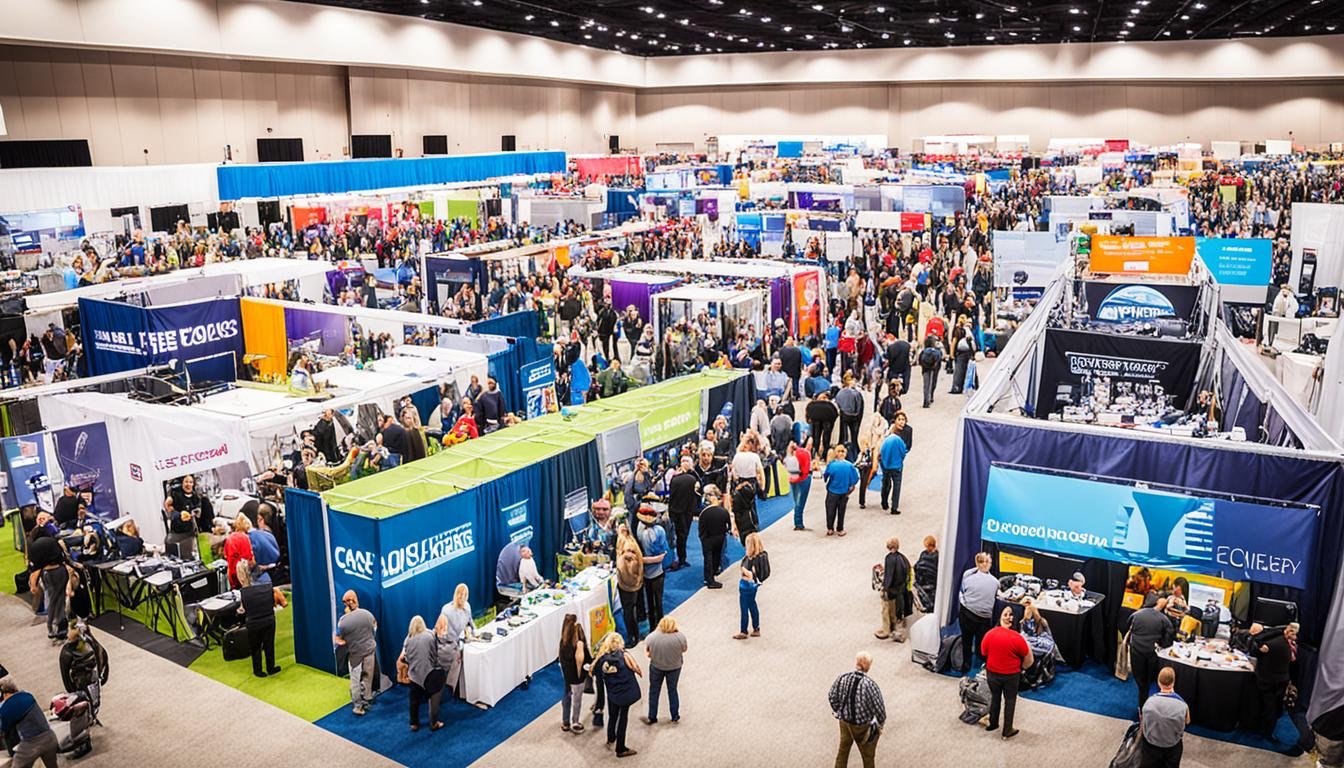Your Guide to Convention Services Essentials
Welcome to your go-to guide on convention services! Whether you’re a veteran event planner or new to conventions, this article has you covered. It’s full of tips and knowledge to help you plan and pull off a successful event.
Let’s start with a story we’ve all probably lived through.
Picture yourself at a digital marketing conference. Walking into the convention center, you see a big group of professionals. They’re from different jobs but all here to learn, meet others, and see what’s new in digital.
The conference is top-notch, with everything planned out perfectly. The main talks and smaller sessions are all key parts. They’re designed to make sure everyone gets something valuable and has a memorable time.
You spent the day learning, trading business cards, and enjoying the lively vibe. You also had great food and drinks that fit what you like to eat.
When the event ends, you’re packed with new know-how, lots of contacts, and a fresh drive to do better. This conference did more than inform you. It connected you with top figures and expanded your career network.
This story shows how impactful a well-run conference can be. Now, let’s dig into how to plan a great event. We will cover the core principles and the nitty-gritty of event management and logistics.
Key Takeaways:
- Introduction to Convention Services.
- Convention planning basics and event services overview.
- Conference management essentials and trade show organizing tips.
- Meeting industry fundamentals and event coordination guide.
- Seminar logistics introduction and expo planning essentials.
What is a Convention?
A convention brings people together to talk or do activities about a specific interest. It’s where you can meet others and make connections. They can focus on a certain industry or bring together fans of a hobby.
These events can last a few days and offer lots to see and do. There are talks, discussions, and chances to learn new things, all under one roof. You might go in person, meeting people face-to-face, or join online from anywhere.
Benefits of Conventions:
Conventions are great for making new friends, learning, and staying updated in your field. They help build community and teamwork, where people can swap ideas and start new projects.
No matter the theme, conventions help fields like tech, fashion, or finance grow and evolve. They’re places to learn and solve problems together.
Virtual Conventions:
Recently, virtual conventions have become very popular. They use tech to bring the convention to you, wherever you are. You can join talks, chat with people, and get special content from home or work.
Online conventions save on travel and let anyone join from around the globe. They use digital tools to make learning and connecting easy.
In-Person Events:
In-person conventions offer something special you can’t get online. They have live interactions, activities, and a lively atmosphere. You get to really experience your interest with others.
Both online and in-person, conventions are key for professional and personal growth. They’re places to learn, meet, and develop, for everyone’s benefit.
Benefits of Hosting a Convention
Hosting a convention brings many good things for the industry and its businesses. It allows people with the same interests to meet. This strengthens the entire industry. The knowledge and views shared boost innovation, encourage working together, and move the industry ahead.
Conventions also let businesses show off their goods and services. Through sponsorships and booths, they get to reach potential customers. It is a great chance for companies to make important contacts, find leads, and be more visible in their field.
“Conventions play a vital role in facilitating change within the industry. They serve as a platform to present and push through new policies or guidelines that can enhance the way business is conducted.” – [Speaker Name], Industry Expert
Moreover, conventions are key in coming up with new ideas. They draw in a mix of people, leading to many ideas and experiences being shared. This often creates new and useful thoughts, improvements, and big ideas that help companies and the whole sector.
Conventions can also help in making better policies and rules. By looking at what works for others in the business, these events let us set better standards. This helps find areas to be better at, making the whole industry grow stronger.
In the end, from meeting new people to sparking fresh ideas, or changing how things are done, hosting a convention can do a lot. It can push the industry to move forward, promote businesses, and bring about good changes in the field.
11 Steps to Plan a Successful Convention
Planning a convention well means following important steps. These steps help make sure your event runs smoothly and makes an impact. Here’s a guide to the key tasks in convention planning.
Determining Goals
First, figure out what you want to achieve. It’s crucial to know how the event fits your organization’s vision.
Choosing a Theme
A good theme makes your event focused and engaging. Pick a theme that your audience will like. Make sure it also matches your event’s goals.
Defining Budget
Setting a realistic budget is vital. Think about all the costs, like the venue, speakers, and how you’ll promote the event.
Picking a Venue
Choose a venue that fits your audience and offers what you need. Consider its location, size, and technology.
Handling Logistics
Don’t forget about important details like food, where people will stay, and how they’ll get there. These things make the event better for everyone.
Inviting Speakers
Invite knowledgeable and engaging speakers. Make sure they’re a good match for your event’s theme and goals.
Creating a Schedule
A detailed schedule is key to a well-organized event. It helps keep things on track and enjoyable for participants.
Connecting with Sponsors
Talk to sponsors who are interested in your event’s theme. Building partnerships with them can make your event better.
Recruiting Staff and Volunteers
Build a team to help with the event. Make sure everyone knows their role. This team effort is important for a successful event.
Crafting Marketing Materials
Make materials that talk about your event in an exciting way. This includes brochures, social media posts, and emails.
Testing Equipment
Before the event, check all your tech equipment. Testing it prevents problems during the convention.
Following Up After the Event
After the event, talk to people to see what they liked or didn’t. This feedback is useful for future events and keeps people connected.
Checklist for Planning a Successful Convention
| Steps | Description |
|---|---|
| Determining Goals | Clearly define objectives for the convention. |
| Choosing a Theme | Select a compelling theme that aligns with the event’s purpose. |
| Defining Budget | Establish a realistic budget considering all expenses. |
| Picking a Venue | Select a suitable venue that can accommodate the audience size and meets the event’s requirements. |
| Handling Logistics | Manage logistical aspects such as food, lodging, transportation, and technical requirements. |
| Inviting Speakers | Invite relevant industry experts and engaging speakers. |
| Creating a Schedule | Develop a detailed schedule outlining the event’s activities. |
| Connecting with Sponsors | Establish partnerships with sponsors to secure financial support. |
| Recruiting Staff and Volunteers | Assemble a competent team to assist during the convention. |
| Crafting Marketing Materials | Create compelling promotional materials to attract attendees. |
| Testing Equipment | Ensure all audiovisual and technical equipment is properly tested. |
| Following Up After the Event | Gather feedback and evaluate the success of the event. |
5 Convention Planning Best Practices
Planning a successful convention takes careful thinking and smart choices. These best practices help your event run smoothly. They make sure everyone – attendees, staff, and sponsors – has a great time.
1. Planning in Advance
Start planning your convention early to set a solid base. Doing this lets you spread out the work. It stops you from making last-minute decisions and missing crucial details. With enough time, you can make sure every part of the event is well thought out and carried through.
2. Using Event Management Software
To stay organized and make planning easier, think about using event management software. It keeps all your event’s info in one place. This includes things like who’s coming, what’s happening, and how it’ll all work. The software helps you keep track of people who’ve signed up, talk to them, and see how everything’s going.
3. Creating Backup Plans
No event is perfect, which is why having backup plans is key. These plans can handle things like tech issues, speaker drop-outs, or venue problems. Having these plans ready means you can quickly solve any problems that pop up during the convention. This keeps things running smoothly for everyone.
4. Implementing Multichannel Marketing
Good marketing gets people excited and increases attendance. A multichannel marketing approach spreads the word through many different methods, like social media, emails, and ads. This way, more people hear about your event from different sources. It leads to a more diverse group of attendees.
5. Asking for Feedback
Listening to what attendees, staff, and sponsors have to say is really valuable. Their feedback helps you make your next conventions better. You can collect feedback in many ways, like surveys or emails. This information tells you what you did well and where you could improve. It’s a great learning tool for making everyone’s experience better each time.
Create beautiful for your convention with these best practices, and watch your event thrive!
The Foundation: Clear Goals and a Strong Team
Setting clear goals is key to planning a winning convention. These goals guide decisions all the way. They make sure everything lines up with what you want to achieve.
Knowing who you’re planning for is also crucial. When you know your audience’s details, you can create an event that meets their expectations. This will make the event unforgettable for them.
“Crafting a realistic budget is a fundamental step in convention planning. Allocating resources effectively ensures that all necessary components, such as venue, catering, and marketing, can be accounted for without exceeding financial limitations.”
Don’t forget to set dates and stick to them. This is vital for smooth planning. It helps you finish each step at the right time.
Building the right team plays a huge part too. Each person should have a role that matches their skills. This way, the whole event runs smoothly because everyone knows what to do. It’s teamwork that makes a big event work well.
| Key Elements for a Successful Convention |
|---|
| Establish clear objectives |
| Define target audience |
| Craft a realistic budget |
| Set dates and timelines |
| Form a skilled team |
Venue Selection and Logistics
Choosing a venue is key to a great convention. The venue is the heart of your event. It’s crucial to think about your goals and what will make guests happy.
Consider how many people will come and what you’ll be doing. Make sure the place has enough seats for everyone. Also, check if you can change the setup to fit your event.
Think about what the venue offers like Wi-Fi, tech gear, and food. Good extras make your event better for everyone. Plus, see if it’s easy for everyone to get to the venue.
If you find the perfect place, make it official with a contract. The contract should cover costs, deposits, and any extra charges. This helps both you and the venue work well together.
“Choosing the right venue is like choosing the right outfit for your event. It sets the tone and creates a lasting impression.”
Picking the right venue is vital for a convention’s success. Focus on size, needs, what’s offered, and how easy it is to reach. And, don’t forget a detailed contract for a smooth event.
Catering and Refreshments
Choosing the right food and drinks is key to making your convention a hit. You should pick a caterer you can trust. They need to offer a menu that fits the event’s theme and meets everyone’s needs.
It’s vital to think about what your guests might want to eat and drink. Make sure there are options for those with special diets. This way, everyone can enjoy the food.
Meal and break times are great for people to mingle and relax. Good planning here boosts the convention experience for everyone. They get to enjoy not just the topics but the meals too.
Also, remember to think about food allergies and preferences. Having food for everyone shows you care about their experience.
“Great food and refreshments can enhance the overall experience of a convention, leaving attendees feeling satisfied and valued.”
Sample Menu
| Meal/Break Time | Menu Selection |
|---|---|
| Breakfast | Assorted pastries, fresh fruit, yogurt, granola, coffee, and tea |
| Morning Break | Coffee, tea, juice, and light snacks |
| Lunch | Variety of salads, sandwiches, hot entrees, vegetarian options, and dessert |
| Afternoon Break | Selection of sweet and savory snacks, tea, coffee, and refreshments |
| Evening Reception | Hors d’oeuvres, signature cocktails, wine, and non-alcoholic beverages |
A varied menu ensures everyone can find something they love. Working closely with your caterer is a smart move. They can help with any special food needs your guests might have.
Remember, good caterers may need to book ahead. Start looking early to find one that fits your needs.
Planning Accommodations and Transportation
Planning a convention’s success means looking at accommodations and transportation. It’s key to make sure attendees have easy, quick ways to get around. Here’s how to handle these things right away.
Evaluating Transportation Options
The first step is to pick the best ways for people to reach the conference. Look at how close airports and public transport are. This helps attendees get to the venue easily.
Considering Proximity to Airports and Public Transportation
Being near airports and public transport is crucial for an easy arrival. Choose a spot close to these places to make it simple for attendees.
Securing Hotel Accommodations
Choosing hotels near the venue makes the trip smoother for everyone. Attendees can easily go back and forth. Offer many stay options to fit different needs and budgets.
Providing Shuttle Services
Shuttle services really help, especially for those not local. Shuttles can take people from the airport, hotels, to the convention. This makes things a lot easier.
Picking the best transport, staying close to hubs, finding good hotels, and offering shuttles are all key steps. Always think about what’s easiest for attendees. Putting them first like this boosts everyone’s experience and the success of your event.
Tackling Event Registration and Ticketing
Event registration and selling tickets are key to a successful convention. There are steps that should be taken to make everything smooth for visitors. This includes:
Clarifying cancellation policy: Defining the rules for canceling is very important. It should be easy for everyone to find and understand. This clarity is good for both sides.
Scheduling extra time for speaker outreach: Getting info from speakers takes time. Planning ahead and giving extra time can make things go smoother. It ensures all needed details are in on time.
Training event check-in staff: The people at the entrance need to know what to do. Giving them good training makes check-ins fast and professional. It helps start the event right for everyone who walks in.
Establishing team communication pathways: Good communication among the team is vital. Using tools for project sharing helps. It prevents mix-ups and makes sure everyone does their part on time.
By using these steps, event planners can make the registration and ticket process better. This leads to a more organized event. Attendees will have a great time because things are well-planned.
Program Development and Content Curation

Developing a program and curating content are key to a successful convention. It’s about matching what the audience likes, getting the right speakers, and using apps to keep people interested. This creates an experience that everyone finds valuable and enjoyable.
1. Polling Audience for Content Preferences
Knowing what the audience likes is vital. Before the event, doing polls or surveys can show what topics and formats they prefer. This lets organizers plan a program that truly meets the audience’s expectations.
2. Recruiting Relevant Speakers
Good speakers make sessions memorable. It’s important to choose those who know about the convention’s theme. Picking speakers respected in their field helps connect with the audience.
3. Aligning Content with Target Audience
When planning, target the audience’s interests and needs. Have a variety of sessions for everyone. Include topics that are up-to-date and common problems, so everyone’s experience is rich and meaningful.
4. Utilizing Conference Apps for Engagement
Apps can make a big difference in engagement. They offer personal schedules, remind about sessions, and introduce you to others. This makes the event more interactive and enjoyable for all.
Benefits of Program Development and Content Curation
| Benefits | Description |
|---|---|
| Increase Attendee Satisfaction | Matching content with what the audience wants boosts their happiness and involvement. |
| Deliver Valuable Insights | By picking the right speakers, attendees learn new and valuable ideas. |
| Create Engagement Opportunities | Using apps opens up more ways for attendees to take part, improving interaction. |
| Relevant and Impactful Sessions | Knowing what the audience likes ensures sessions are meaningful and meet their hopes. |
By focusing on the program and content, convention organizers can make an event that amazes. With attention to audience tastes, speaker quality, and app use, conventions turn into experiences everyone loves.
Conclusion
Having a successful convention requires focusing on the details and following the best practices. Planners need to go through this guide and use the tips. This way, the event will be smooth and keep people interested.
It’s important to keep making the convention better. Getting feedback from those who come can show what needs work. Then, changes can be made for the next conventions. Doing this makes the event more satisfying for everyone.
Proper planning, managing logistics well, and choosing content carefully can help a convention meet its goals. Keep looking for ways to improve and use good planning tips. This will make your event stand out and meet the expectations of your audience.
FAQ
Q: What is a convention?
A: A convention brings people together to talk about a specific subject or do activities they all like. It is a chance to network and learn new things.
Q: What are the benefits of hosting a convention?
A: Hosting a convention boosts the industry, showcases related businesses, and promotes change. It’s a big opportunity to share new ideas and improve existing rules.
Q: What are the steps to plan a successful convention?
A: The first steps in planning a convention are to set goals and pick a theme. Then, you need to make a budget, find a place to hold the event, and take care of the details.
Next, you should invite speakers and plan the schedule. Also, reach out to sponsors and gather a team of helpers. Don’t forget to let everyone know about the event.
Q: What are the convention planning best practices?
A: To plan well, start early and use the right software. Always have a backup plan and advertise in many ways. Lastly, listen to what attendees and partners have to say.
Q: What is the foundation of a successful convention?
A: The key to a great event is to have clear goals and know who it’s for. Set a budget that works and pick the best times to hold it. A good team is also essential.
Q: How do you choose the right venue for a convention?
A: A good venue fits the crowd and the activities. It must have what’s needed and be easy to get to for everyone.
Q: What should be considered when planning catering and refreshments for a convention?
A: For food and drinks, pick someone who’s dependable. The menu should match the event’s style and meet different food needs. Plan well when to eat and rest, and remember dietary requirements.
Q: How do you plan accommodations and transportation for a convention?
A: Think about how everyone will get to the event and where they’ll stay. Choose hotels close by, and think about airport and transit access. Shuttles can make things simpler for guests.
Q: What should be considered when tackling event registration and ticketing for a convention?
A: Make sure people understand how cancelling works and give time to prep for speakers. Train the staff that will check people in, and set up ways for everyone to talk.
Q: How do you develop the program and curate content for a convention?
A: Know what the audience wants by asking them or looking up ideas. Pick speakers who have interesting things to say that match what the crowd likes. Using special apps can get the audience more involved.







